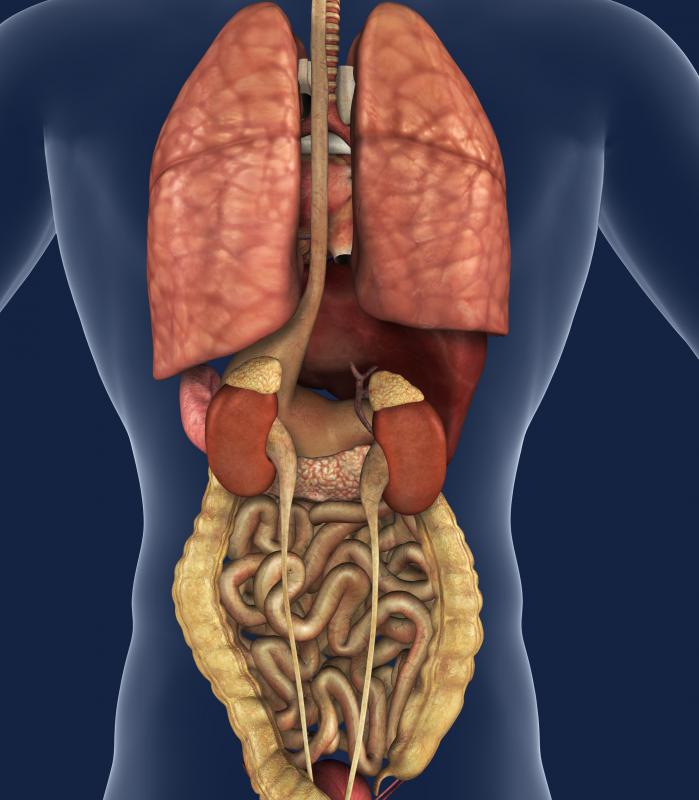At WiseGEEK, we're committed to delivering accurate, trustworthy information. Our expert-authored content is rigorously fact-checked and sourced from credible authorities. Discover how we uphold the highest standards in providing you with reliable knowledge.
What is Legionnaire's Disease?
Legionnaire's Disease is a type of pneumonia that is caused by a bacteria called Legionella. The bacteria was given this name because of an incident that occurred in 1976. In this year, a Philadelphia convention held by the American Legion was marred by an outbreak of serious illness amongst its attendees.
The disease was subsequently called Legionnaire's Disease, a disease in which symptoms include fever, chills, muscle pain, and a chronic cough. Symptoms often appear within two to 14 days after exposure to the bacteria. As the disease progresses, victims may experience nausea, vomiting, pains in the chest, loss of appetite, and shortness of breath.

People contract Legionnaire's Disease when they breathe moist air contaminated by the Legionella bacteria. The bacteria thrives in a warm, damp environment, including areas around air conditioning systems, hot tubs, or plumbing systems. Smokers and people 65 years and older are at higher risk of developing this serious lung disease. In some cases, patients can die from Legionnaire's Disease if left untreated. This disease cannot be spread from person to person; it must be inhaled from the environment.

Legionella, the bacteria that causes Legionnaire's Disease, can also cause another medical condition called Pontiac Fever. A mild illness resembling the flu, Pontiac Disease usually goes away on its own without the use of antibiotics or other medical treatments. In contrast, those who develop the more serous Legionnaire's Disease must receive antibiotics in order to be cured of this ailment. Treatment should begin as soon as possible in order to risk serious complications or even death.

Several complications can arise from the disease caused by Legionella bacteria. For example, some patients may experience respiratory failure, their lungs unable to accept enough oxygen. Others may suffer from a sudden drop in blood pressure. In order to compensate for this occurrence, the heart tries to work harder but becomes weaker in the process. Other patients may even experience kidney failure.

The physician will conduct a series of tests in order to determine if a patient has Legionnaire's Disease. Blood tests, CT scans, and tests of lung tissue and sputum are typical tests the doctor will conduct on a patient suspected of having this disease. The doctor may order a chest x-ray to determine if the patient has a lung infection. If it is determined that the patient has the disease, the physician will prescribe antibiotics to treat it. Antibiotic treatment is necessary since patients can die if the bacteria is not eliminated from the patient's body.
AS FEATURED ON:
AS FEATURED ON:















Discussion Comments
The problem with Legionnaire's Disease is that the symptoms are too generic. My father, who is generally a robust and healthy guy, developed the basic muscle aches and fever which could be pretty much one of a hundred diseases.
Rather typically he laughed off any suggestions that he see a doctor. It was only when he started getting confused that we could get him to a hospital. By this time it was around five or six days since exposure and he was lucky to survive with no long term problems.
He caught it from an air conditioning system in his office. Being self employed means he was the only one exposed, which is a good thing. Hovever, had there been more people around who got sick at the same time he may have had a swifter diagnosis.
I really urge people who suspect they may have Legionnaire's Disease to check in with others they work with or spend time with in any high risk environment. It could be the difference between life and death.
There are a number of different types of pneumonia. Some are caused by a virus and some are caused by bacteria. Legionnaires disease is one that is caused by a bacteria.
I have had viral pneumonia, so an antibiotic wouldn't get rid of a viral infection. In my case, the doctor gave me an antibiotic, just in case it turned into a bacterial infection. But not all doctors give an antibiotic for viral pneumonia.
With Legionnaires disease, the patient must get on an antibiotic or risk becoming very ill or even dying.
I remember the incident in Philadelphia when so many became sick at the American Legion convention. It was on the news constantly. At first, nobody knew what the illness was or if it was going to become an epidemic. Finally, they figured what it was and that it was confined to those attending the American Legion Convention.
People can certainly get frightened when an unknown illness hits. And for good reason. They didn't know if this one was contagious or what.
I'm glad they found out what the cause was because it can be a very serious illness.
A friend of mine's uncle got this disease while in the hospital, which is apparently one of the easiest ways to get it. He was fine, because they found out right away, and he was in really good health, he was only there for something simple to begin with. It has a really high fatality rate when it's caught in hospital, though. It's scary to me that hospitals could be dangerous in that way.
Post your comments